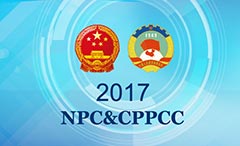Ambassadors: China’s decisions influence world
2017-03-05
China Daily
With the two sessions beginning, seven ambassadors discuss what they see as the major issues, including China’s economic performance, its role in the international arena and the Belt and Road Initiative. Their views highlight the importance of the event on a global stage.
Masood Khalid, Pakistan’s ambassador
The annual two sessions will continue to provide new solutions to increasing protectionism and provide ideas to accelerate the Belt and Road Initiative, said Masood Khalid, Pakistan’s ambassador to China.
The diplomat described what intrigues him most when it comes to the annual gathering of the country’s lawmakers and political advisers.
“Like most international observers, I will watch with keen interest the proceedings of the two sessions, especially on the economy and connectivity,” he said.
He noted China’s continued focus on reform and opening-up, innovation, social development and environmental protection.
“We will be interested to know the guidance the Chinese leadership provides on economic development in light of this year’s Government Work Report,” he said.
“President Xi Jinping’s visionary Belt and Road Initiative provides an innovative solution to the challenges being faced by the global economy through inclusiveness, mutual trust and win-win cooperation, and building a community of shared destiny,” he added.
The ambassador noted that the Chinese economy in 2016 beat expectations and achieved its GDP growth target of 6.7 percent.
“Industrial output, fiscal revenue and foreign investments have increased, creating more jobs and increasing average incomes. The critical social sectors of education, health and social security have also seen considerable improvement. These are encouraging signs and will have a positive impact on the global economy,” he said.
Khalid said China’s Western Development Strategy is closely linked to the China-Pakistan Economic Corridor, which has added a new chapter in the long history of the close and comprehensive partnership.
“I am confident that as we move forward, the Chinese economy will continue to achieve stable growth and sustainable development.” he said.
Lela Mani Paudyal, Nepal’s ambassador
The Nepalese ambassador to China said he hopes the two sessions will see policies that maintain China’s economic growth and stability, allowing the country to play a constructive role for international prosperity.
Lela Mani Paudyal said China is a major contributor to global economic growth, the second-largest contributor of foreign direct investment, the largest tourist generating country and a major contributor of assistance to the developing world.
“I hope the meeting will bring about pragmatic and effective policies to protect the environment while augmenting economic development, and adopt pragmatic policies to help peacefully resolve conflicts around the globe,” he told China Daily.
The diplomat said he was most impressed by China’s efforts over the past years in poverty alleviation, anti-corruption, and the Belt and Road Initiative.
“Bringing hundreds of millions of people out of poverty in the past 30 years is a highly commendable job,” he said.
He also said the initiative provides alternative development models that aim at bringing global prosperity with inclusion and harmony among people of different countries, ethnicities and cultures. In his opinion, the major priorities of the Chinese government this year should be to further enhance its constructive engagement in global governance in the areas of prosperity, harmony and peace.
Shakhrat Nuryshev, Kazakhstan’s ambassador
The two sessions will draw the attention of the world, given the continued strength of the economic growth in China, despite the many global uncertainties, said Shakhrat Nuryshev, Kazakhstan’s ambassador to Beijing.
He told China Daily that China’s economy is actively seeking new growth drivers.
Nuryshev said China, despite the status of a developing country, is one of the largest economies in the world and a key player in the international arena.
In recent years, under the leadership of President Xi Jinping, China has demonstrated an active foreign policy and is boldly seeking out new foreign markets. The role and place of China, as a responsible world power, is growing day by day, he said.
“Therefore, I can firmly state that the issues at the two sessions will not be minor issues for us. All questions will be important in terms of the need for an in-depth study of China’s future plans and strategies for further development,” he said.
“How successful China will be in overcoming the existing difficulties and in ensuring economic growth within the 6.5 to 7 percent range has attracted the attention of the entire world community,” he said.
“This is primarily because China provides about a quarter of global economic growth and has a direct impact on the economic situation of countries that are its trade and economic partners.”
The ambassador said Kazakhstan is a close neighbor, a reliable friend and strategic partner of China and occupies one of the most important places in the Silk Road Economic Belt.
The Silk Road Economic Belt was announced by Xi during a visit to Kazakhstan in September 2013. It has a deep symbolic and practical meaning, as the main transport corridors from China to Europe, Central Asia, the Caucasus, the Middle East and the Persian Gulf have already been built, put into operation and tested in Kazakhstan, according to the ambassador.
Diego Ramiro Guelar, Argentina’s ambassador
Argentine Ambassador to China Diego Ramiro Guelar said he expects China to be supremely capable of planning for the benefit of its people, while fully considering its international responsibility during the two sessions.
Guelar said the two sessions have enormous potential as an example of the diversity and complexity of the Chinese leadership, including a meeting of some 5,000 people who are deputies to the National People’s Congress and members of the National Committee of the Chinese People’s Political Consultative Conference, who are from all walks of life, including economists, academics and artists.
“I think that, once again, China will show, to both the ambassadors posted here and the international community, a great capacity for planning for the benefit of its people.
But this opportunity will happen within a new scenario,” in which China fully realizes its potential for an international role, he said.
According to Guelar, last year was crucial for both China and the international community, because China has become a powerful state that participates in the most pressing global issues.
“A clear example is environmental issues. A few years ago, China was globally perceived as trying to avoid facing such problems, but the country has now become one of the leaders in this field,” he said.
The ambassador thinks one of the main challenges for the Chinese government in 2017 is to ensure that the world fully understands the political and economic processes that are taking place in China.
“Therefore, policies focused on both communication and culture are crucial,” he added.
Jean-Jacques de Dardel, Switzerland’s ambassador
Switzerland is looking forward to China renewing its commitments to multilateralism, open economies and free trade during the two sessions, Swiss Ambassador to China Jean-Jacques de Dardel said. ambassador
“Chinese foreign policy is geared toward multilateralism, openness of market and free trade,” de Dardel told China Daily.
“The creation of the Asian Infrastructure Investment Bank is welcome proof that China is ready to not only focus on bilateral relations, but to operate in a multilateral sphere,” he added.
Speaking highly of speeches made by President Xi Jinping in January during his trip to Switzerland, de Dardel said that he hopes China will continue to be dedicated to openness and free trade.
“The two sessions will bring more substance to what Iheardin Davos, Geneva and Bernrecently,” he added.
The Swiss ambassador hailed China’s Belt and Road Initiative as “a clever move”, which he said shows China’s “openness, wish to engage the world and the desire to take on responsibility that goes beyond self-serving aspects of the development of trade”.
During his visit to Switzerland, Xi invited Swiss President Doris Leuthard to attend the Belt and Road Initiative International Cooperation Forum Summit in Beijing in May. The two leaders also witnessed the signing of 10 cooperative agreements.
“This is obviously a golden age in our relations,” the Swiss ambassador said.
Out of the Chinese government’s development priorities-innovation, coordination, a green economy, openness and sharing-three are of particular interest to Switzerland: innovation, a greener society and openness, de Dardel said.
“We see on both sides how important we are to each other in so many different fields-all economic areas, trade and finance,” he said, adding that the two countries could also cooperate on international affairs.
Karunasena Kodituwakku, Sri Lanka’s ambassador
Sri Lankan Ambassador to China Karunasena Kodituwakku said he is interested in discussions at the two sessions on China’s international role.
“The volume of China’s international trade and foreign direct investment in other countries is becoming a critical factor for many countries,” Kodituwakku said.
He added that China is likely to become the most important development partner of many emerging countries in Asia, Africa and Europe in 2017.
“The Chinese government’s encouragement of its entrepreneurs to go global should lead to an expansion in Chinese foreign investment in Asia, Africa and Europe,” he said, adding that banks such as the Asian Infrastructure Investment Bank and the Export-Import Bank of China will continue to finance projects in various countries.
Kodituwakku said that the most important challenge facing the Chinese government in 2017 is to sustain the country’s economic growth in a time when large economies, such as the United States, are turning to “more inward-looking trade and investment policies”, which may have a negative effect on China’s trade with these countries.
However, the Sri Lankan ambassador expressed optimism over China’s ability to reach its economic growth goal for this year, pointing out that its Belt and Road Initiative has attracted the participation of a number of economies.
John McKinnon, New Zealand’s ambassador
New Zealand Ambassador John McKinnon said that his country is particularly interested in how free trade and climate change are reflected and discussed in the annual meetings of China’s top legislature and political advisory body.
McKinnon said he expects China and New Zealand to upgrade their existing free trade agreement, which was signed and took effect in 2008 to boost bilateral trade.
New Zealand was the first developed economy to sign such an agreement with China. The New Zealand-China relationship is very strong and is characterized as a comprehensive strategic partnership as announced by President Xi Jinping and former prime minister John Key in 2014, McKinnon said.
“One of the most important ways we’ve been building on the partnership is to look at how to upgrade the free trade agreement. Since then, there’s been a huge growth in the trade between our two countries. And that is continuing and now we are reaching new areas such as services, e-commerce and many other aspects of trade,” he said.
Of the two sessions, the ambassador said: “There are two areas that are particularly of interest to us: One is to follow President Xi’s speech at Davos, when he presented China’s strong position on globalization, international trade and an open economy.
“These are things we very much welcome and we will be interested to see how they are reflected in Premier Li Keqiang’s Government Work Report and also in the subsequent discussions at the congress.”
He said the second area covers climate change. A few weeks ago, Zhang Yong, vice chairman of the National Development and Reform Commission, met with New Zealand’s Deputy Prime Minister Paula Bennett in New Zealand during the first ministerial-level dialogue on climate change.
“That will be the focus of our follow-up discussions between officials and between our leaders,” the ambassador said.


